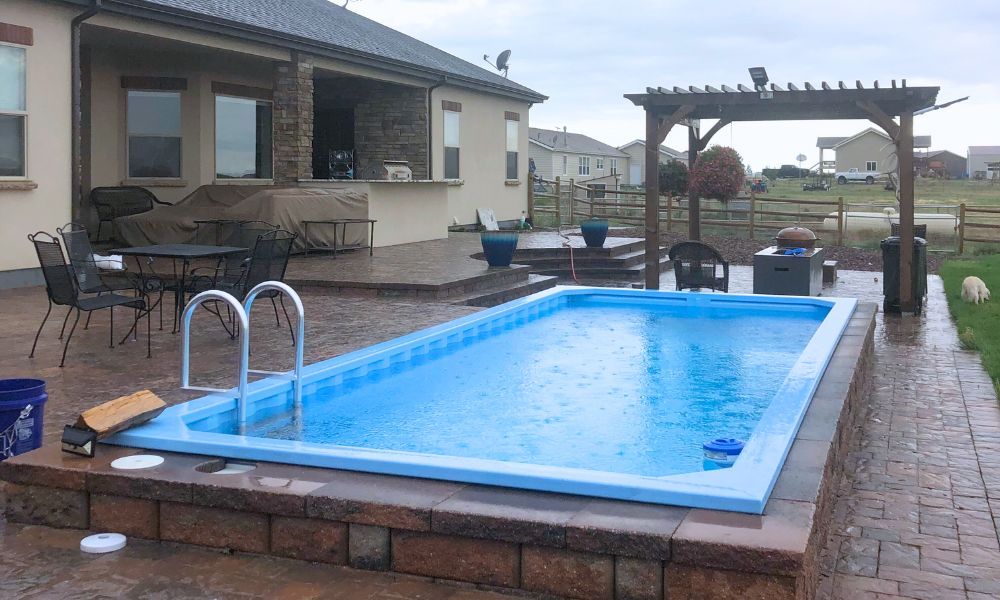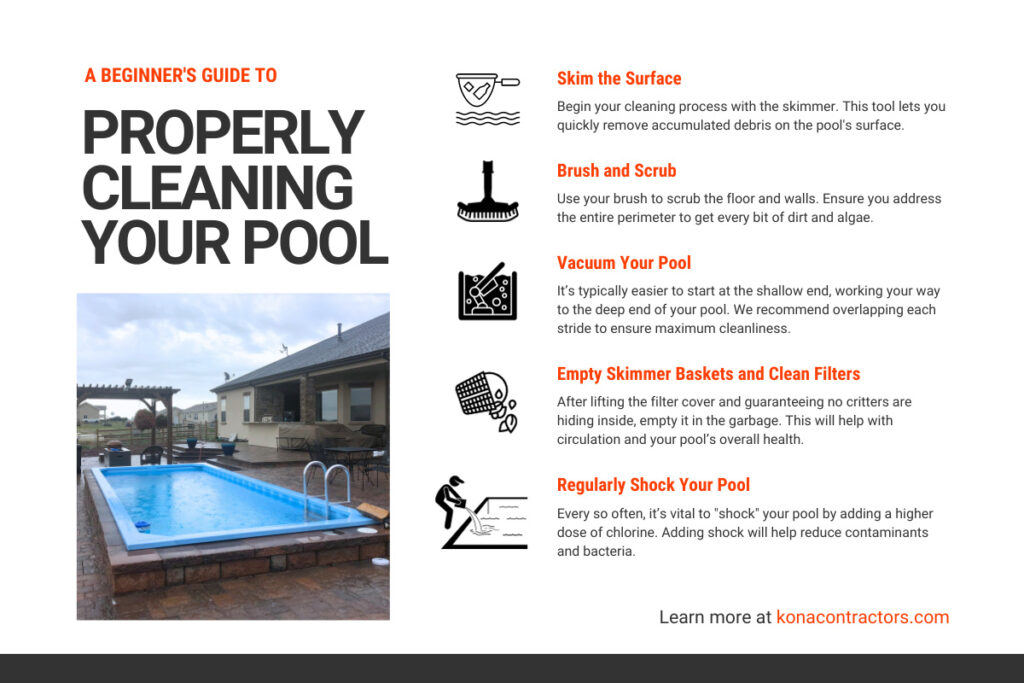
A Beginner’s Guide to Properly Cleaning Your Pool
A beautifully maintained pool can be the focal point of your outdoor refuge, providing a refreshing escape and a picturesque setting for relaxation and recreation. This comprehensive beginner’s guide to properly cleaning your pool is essential for any new owner and may even refresh the memory of a seasoned pool enthusiast. Let’s dive in and go over how to keep your aquatic haven pristine and sparkling.
Gather Your Pool Cleaning Essentials
You’ll need a few tools to start. Here is a checklist of everything you might need for proper cleaning:
- Pool skimmer: This long-handled tool has a net attachment that’s perfect for getting debris off the top of the water
- Pool brush: This is ideal for scrubbing the sides of the walls and the bottom of the floor. It removes pesky algae and other dirt.
- Pool vacuum: The vacuum will suction up any debris or dirt from the pool floor and walls after scrubbing
- Pool chemicals: These include chlorine, shock, and certain reducers. Pool chemicals work to sanitize and rid your pool of any harmful bacteria.
- Water testing kit: This can come in both a kit and a test strip. Water testing kits check your pool’s pH and chlorine levels, ensuring it’s safe for swimming.
- Telescopic pole: This will make all cleaning tasks easier and safer, as it attaches to your equipment and elongates their reach.
- Safety equipment: This includes lifejackets, preservers, and first aid kits for any emergencies that may happen in or near the pool.
Skim the Surface
Begin your cleaning process with the skimmer. This tool lets you quickly remove accumulated debris on the pool’s surface. Pay close attention to areas where bushes sit and trees hang overhead, as these tend to collect more unwanted sticks and leaves.
Brush and Scrub
Use your brush to scrub the floor and walls. Ensure you address the entire perimeter to get every bit of dirt and algae. Pay extra attention to areas with less circulation, such as ladders and steps, as these can grow the most algae. If any part of your pool is tile, purchase a tile brush since a normal brush may be too rough for cleaning.
Vacuum Your Pool
If you have a manual vacuum, attach it to the telescopic pole and follow your systematic pattern to vacuum the entire pool bottom. It’s typically easier to start at the shallow end, working your way to the deep end of your pool. We recommend overlapping each stride to ensure maximum cleanliness. Empty the vacuum bag as needed.
If you have an automatic cleaner, this task is much simpler. Follow your manufacturer’s instructions for set up and let it do its thing! Mechanical cleaners are a great time-saver when maintaining your pool, especially if you have a larger area to clean.
Test and Adjust Water Chemistry
Test your pool water regularly, especially during peak use. Using an at-home testing kit or test strips, you can check and control the chemistry of your water. Depending on which method you choose to purchase, these steps can vary:
- Test strips: A quick and easy way to test pool water, these will give you results in seconds. The chemical balance is easily detectable after dipping the strips in the water and shaking off excess droplets. However, they are less reliable than the testing kits, and if all the strips accidentally get wet before use, they become useless.
- Testing kits: These will give you a highly accurate reading via titration and reagents. This tool will also last longer than test strips, improving overall reliability.
- Digital testing kits: Perhaps the most accurate of the testing methods, a digital testing kit makes this job fast and dependable. The undeniable downside is that a decent device is more expensive.
Testing kits check three things: pH, chlorine concentration, and alkalinity. For reference, the ideal pH level should range from 7.2 to 7.8. The free chlorine concentration levels should range from 2.0 to 4.0 parts per million (ppm). A pool’s alkalinity, which helps stabilize pH levels, should range from 80 to 120 ppm.
Empty Skimmer Baskets and Clean Filters
The job that no one enjoys but is inherently necessary is cleaning out the skimmer baskets and filters. These spots collect all the hidden debris and other undesirables that end up in your pool. After lifting the filter cover and guaranteeing no critters are hiding inside, empty it in the garbage. This will help with circulation and your pool’s overall health.
Regularly Shock Your Pool
Every so often, it’s vital to “shock” your pool by adding a higher dose of chlorine. Adding shock will help reduce contaminants and bacteria. Doing this after a big storm or following a busy pool party is essential for the health of your water. These are strong chemicals, so use caution and avoid swimming for at least 24 hours after treatment.
Focus on Circulation
After completing your cleaning tasks, ensure your pool has adequate circulation. Your pump or filter is likely defective if the water is not effectively moving around. A lack of circulation will make it exceedingly difficult to keep your pool clean since your equipment is working against your best efforts. Check out the potential issue and address it as soon as possible.
There are three main aspects of circulation. Focus on these pieces of aquatic equipment to ensure maximum movement and filtration:
- Pump: This sucks the water from the pool, sending it through the filter.
- Filter: This cleans out particles that may be negatively impacting the water.
- Jets: These move water back into the pool from the filter system.
Hire Reliable Pool Contractors
Professional contractors have the knowledge and experience to tackle complex pool problems, perform repairs, and offer expert advice. Certain shapes, sizes, and materials of pools also make it easier to clean and maintain. When designing, consider seeking assistance from pool contractors in Denver that you can trust.
After following this beginner’s guide to properly cleaning your pool, you can enjoy inviting and refreshing bliss throughout the entire swim season. If you’re looking to design and build your dream pool, contact Kona Contractors. Our experts will work to give you an aquatic paradise that satisfies your needs. You’ll have ease of maintenance, cleanliness, and lots of fun!

